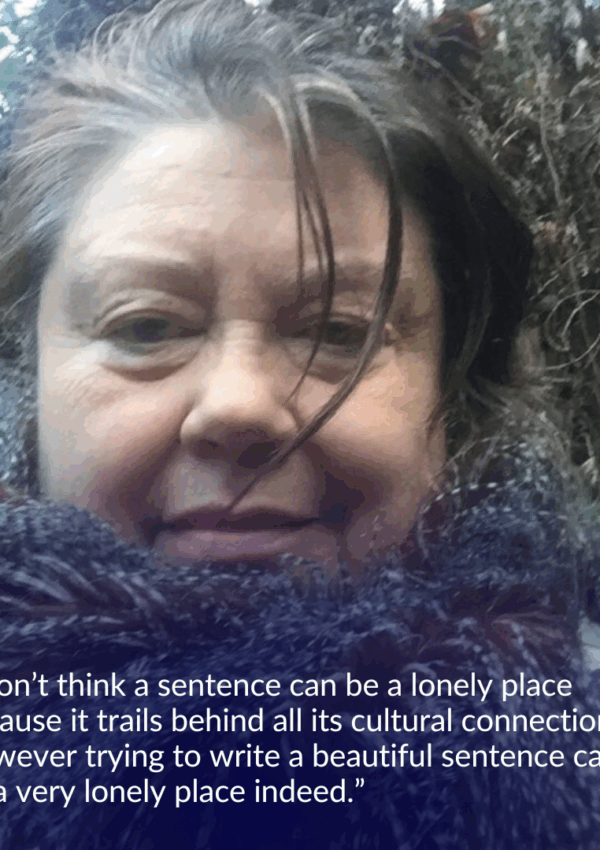Jack Kerouac famously said “be in love with your life. Every minute of it.” Certainly as writers, we try to embrace this notion. The creating, the expressing, the transformation of thought to word, the sharing of what we do with like-minded artists – all of that feeding our aliveness and love of our craft.
It is that last item – sharing what we do – that comes to mind when I consider that classic picture of a lonely soul curled over a typewriter, crumpled paper at his feet. This image is simultaneously romantic and disturbing. We might imagine that we are cheating our craft unless we are alone, bleeding words, and sacrificing our socialness. And while we might admire loners, being one is often too, well, lonely.
We need a way to balance this aloneness so that writing becomes who we are all the time, not just in the stolen moments we carve out of a busy day. We need to talk shop, be with other writers who understand why we aren’t doing it for the money, other writers who are in love with language in the same way we are. And becoming part of a writing community can help us do just that.
Workshops are one way, of course. I have never taken a tally of how many I have attended over the years, but I wouldn’t be surprised if it were close to 500. I have been to local workshops sponsored by literary organizations, both ongoing and one-day, as well as writers’ conferences. It’s a great outlet to bring new work to and connect to the thoughts of others. It’s critical to you as a writer that you hear and see first-hand what is going on in the field.
Most recently, I have found the importance of a writing community to be best served by attending poetry readings. At readings, you make the jump from apprentice to professional and the work is now presented on its own merit. I am lucky enough to live in NYC, where every single night there are at least two good readings to attend. I have also lived in smaller areas, and readings abound there, too.
Going to readings helps you as a writer in many ways. First is, most obviously, the social aspect. As an introvert, like many writers, I cringe at the prospect of entering a roomful of people, even if I know them. What will we talk about? What if no one wants to talk to me? What if? What if? Well, going into a room, a bar, an art gallery, armed with the purpose of reading my work, or even listening to someone else’s relieves that anxiety. After the reading, the discussion flows about each other’s work. It feels natural to approach others and to be approached.
Second, is that it is important to hear others’ work. You get to hear what’s possible to do in a poem. For example, maybe you think forms such as sonnets, villanelles, or even rhyme are confined to high school textbooks. Maybe you’ve never considered writing in form because you just don’t think it’s relevant. Then boom, you go to an open mic and someone kills it with a sestina. You go home and try it. Where has it been all your life?
Or perhaps you think something you have been feeling is too personal to write about. When you hear others reading poetry about their private lives, you become empowered to do the same. It’s not so much a therapy as a way to connect.
Third, going to readings is great motivation to create and test new work. After being on the open mic circuit for a while, you will find out by the audience reaction what is working in your poetry. An audience becomes a separate organism giving feedback with laughter or audible wow’s and even a gasp or two. Often I have had the experience of bringing a poem to a reading that I didn’t really feel that great about, only to get a great reaction from the audience and therefore, feeling much more confident about it.
After a while, you will start being asked to feature at readings and you will see how your poems work as a mini-collection and thus can even lead to you assembling a chapbook.
You may feel that you live in a small town and there are not enough readings near you. In that case, you might want to start your own. I’ve been to readings in diners, coffee shops, basements, bars, libraries, community gardens and even people’s apartments.
There are so many more reasons to become part of the writing community in your city or town. You can sell your books, gain performing experience, and just rediscover fun.
So get out there. You are most likely on Facebook. They have groups that list readings in your city. If you’re not on FB, then Google “poetry readings near me.” Make it happen.
Change that vision of the lonely writer with the crumpled pages into one of a productive soul connected to others. Balance it with a social aspect. You will start to see yourself as a writer all the time, every minute, not just when you are alone with your pages. You will start to see your life as one whole thing. a life that Kerouac would surely say you could be in love with.
 Francine Witte is the author of five chapbooks, most recently Not All Fires Burn the Same, which won the 2016 Slipstream press chapbook competition. She is a photographer, blogger, and reviewer. She lives in NewYork City.
Francine Witte is the author of five chapbooks, most recently Not All Fires Burn the Same, which won the 2016 Slipstream press chapbook competition. She is a photographer, blogger, and reviewer. She lives in NewYork City.
Francine’s poetry appears in Black Fox Issues 11 and 12.




I love Francine’s work and the community of poets. Thank you for this fine article that speaks many truths.
Ms. Witte’s article speaks volumes of truth for all writers. Young or old, novice or prize winner, we writers relish community, feedback, and inspiration from our peers.
This article provides a great perspective on why writers need community- and how to seek it. Thank you, Francine, for providing such a relevant, relatable resource.